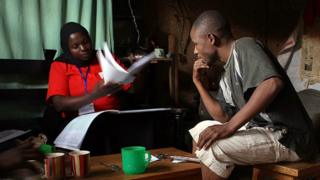Kenya census: Why counting people can be controversial

Image copyright
Getty Images
Kenya’s population census figures have been released, causing controversy among some groups who feel the results are not fair or accurate.
It found that the total population of the country is now 47.6 million, nine million more than in 2009.
But some regions have experienced a decrease in population.
These outcomes can be hugely controversial because the size of the local population has important implications for the level of government funding they receive.
Why does population size matter?
Kenya’s population is made up of many different ethnic groups, closely aligned to competing political parties.
The government has yet to release all the data on the ethnic composition of the country, but the changes in population in certain regions from this latest census have already caused arguments.
The outcome of such surveys can embolden or weaken claims made by groups for political representation or resources.
In one area of the north-east territories bordering Ethiopia and Somalia, the census indicates a decrease in the population, prompting local political leaders looking to retain funding for their provinces to question the veracity of the survey.
Image copyright
Getty Images
The figures also reveal a high gender imbalance in the area, with significantly more males than females, leading some to speculate it might be due to a higher incidence of female mortality or an influx of single men who have moved there to work.
“This data, which was released this week, is false and not fit for purpose,” says Aden Duale, a politician who represents a constituency with a large Somali population.
He argues that as Somali men normally have more than one wife, you would expect the numbers of women to be higher.
The Kenyan statistics bureau has defended the accuracy of the figures.
What is a census and how does it work?
A census is when a government collects information about its people.
This generally includes demographic data such as household population, religion and ethnicity. Censuses are usually carried out every 10 years.
Image copyright
Getty Images
It’s a huge undertaking that involves mapping every home in the country and then visiting them to gather answers to a series of questions.
Some countries are ditching pen and paper for a digital process, in which people fill out a form online.
In Kenya the census is carried out by officials who go door-to-door, recording information on electronic tablets, which send the information to a central database.
Collecting information can sometimes prove difficult. Communities with little trust in their government can be unwilling to reveal personal details.
How do governments use the information?
The outcome of the census can have a real-world impact on its citizens.
In Kenya, not only is the distribution of government funds directly linked to regional population size, it’s also the case that constituency boundaries are drawn up using census data.
Image copyright
Getty Images
The more divided a country, the more contentious a census tends to be.
Ethiopia has postponed its census twice since 2017 because of protests and ethnic violence.
When it does finally happen, the outcome will be significant for groups vying for more regional powers – the larger the ethnic group, the stronger it will feel its claim for self-determination under Ethiopia’s ethnically-based federal system.
The Sidama ethnic group in southern Ethiopia, for example, is campaigning to have its own state.
Nigeria has a long history of controversial censuses and was due to hold another one in 2016, but a lack of funds and logistical issues mean it’s yet to happen.
And in Lebanon, the quota of representatives in parliament from particular regions is linked to population data in the census.
However, issues of demography there are so controversial there that there hasn’t been a full census in Lebanon since 1932.



0 comments